

Augustin-Louis Cauchy. Baron Augustin-Louis Cauchy (French: [oɡystɛ̃ lwi koʃi]; 21 August 1789 – 23 May 1857) was a French mathematician who was an early pioneer of analysis. He started the project of formulating and proving the theorems of infinitesimal calculus in a rigorous manner, rejecting the heuristic principle of the generality of algebra exploited by earlier authors. He defined continuity in terms of infinitesimals, almost singlehandedly founded complex analysis and initiated the study of permutation groups in abstract algebra. A profound mathematician, Cauchy exercised a great influence over his contemporaries and successors.
His writings cover the entire range of mathematics and mathematical physics. Biography[edit] Youth and education[edit] Cauchy was the son of Louis François Cauchy (1760–1848) and Marie-Madeleine Desestre. Cauchy married Aloise de Bure in 1818. Cauchy's father (Louis François Cauchy) was a high official in the Parisian Police of the New Régime. Georg Cantor. Georg Ferdinand Ludwig Philipp Cantor (/ˈkæntɔr/ KAN-tor; German: [ˈɡeɔʁk ˈfɛʁdinant ˈluːtvɪç ˈfɪlɪp ˈkantɔʁ]; March 3 [O.S.
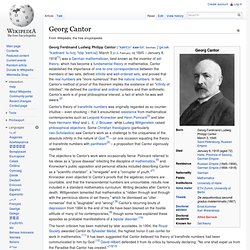
February 19] 1845 – January 6, 1918[1]) was a German mathematician, best known as the inventor of set theory, which has become a fundamental theory in mathematics. Cantor established the importance of one-to-one correspondence between the members of two sets, defined infinite and well-ordered sets, and proved that the real numbers are "more numerous" than the natural numbers. In fact, Cantor's method of proof of this theorem implies the existence of an "infinity of infinities". He defined the cardinal and ordinal numbers and their arithmetic. Cantor's work is of great philosophical interest, a fact of which he was well aware.[2] The harsh criticism has been matched by later accolades. Carl Friedrich Gauss. Johann Carl Friedrich Gauss (/ɡaʊs/; German: Gauß, pronounced [ɡaʊs]; Latin: Carolus Fridericus Gauss) (30 April 1777 – 23 February 1855) was a German mathematician who contributed significantly to many fields, including number theory, algebra, statistics, analysis, differential geometry, geodesy, geophysics, mechanics, electrostatics, astronomy, matrix theory, and optics.
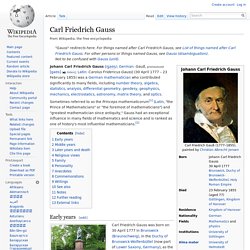
Sometimes referred to as the Princeps mathematicorum[1] (Latin, "the Prince of Mathematicians" or "the foremost of mathematicians") and "greatest mathematician since antiquity," Gauss had an exceptional influence in many fields of mathematics and science and is ranked as one of history's most influential mathematicians.[2] Early years[edit] Gauss was a child prodigy. There are many anecdotes about his precocity while a toddler, and he made his first ground-breaking mathematical discoveries while still a teenager.
The year 1796 was most productive for both Gauss and number theory. Srinivasa Ramanujan. Srinivasa Ramanujan Iyengar FRS (pronunciation: i/sriː.ni.vaː.sə raː.maː.nʊ.dʒən/) (22 December 1887 – 26 April 1920) was an Indian mathematician and autodidact who, with almost no formal training in pure mathematics, made extraordinary contributions to mathematical analysis, number theory, infinite series, and continued fractions.
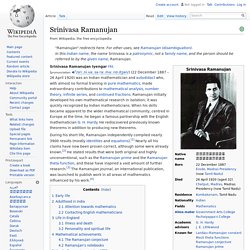
Ramanujan initially developed his own mathematical research in isolation; it was quickly recognized by Indian mathematicians. When his skills became apparent to the wider mathematical community, centred in Europe at the time, he began a famous partnership with the English mathematician G. H. Hardy. Early life[edit] Ramanujan's home on Sarangapani Street, Kumbakonam Ramanujan was born on 22 December 1887 in Erode, Madras Presidency (now Pallipalayam, Erode, Tamil Nadu), at the residence of his maternal grandparents in a Brahmin family.[5] His father, K.
Since Ramanujan's father was at work most of the day, his mother took care of him as a child. Mr. For all. Joseph Louis Lagrange. Joseph-Louis Lagrange (born Giuseppe Lodovico Lagrangia [1][2][3] (also reported as Giuseppe Luigi Lagrangia [4]), 25 January 1736 in Turin, Piedmont; died 10 April 1813 in Paris) was an Italian Enlightenment Era mathematician and astronomer.
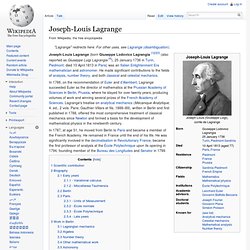
He made significant contributions to the fields of analysis, number theory, and both classical and celestial mechanics. In 1766, on the recommendation of Euler and d'Alembert, Lagrange succeeded Euler as the director of mathematics at the Prussian Academy of Sciences in Berlin, Prussia, where he stayed for over twenty years, producing volumes of work and winning several prizes of the French Academy of Sciences. Lagrange's treatise on analytical mechanics (Mécanique Analytique, 4. ed., 2 vols. Paris: Gauthier-Villars et fils, 1888–89), written in Berlin and first published in 1788, offered the most comprehensive treatment of classical mechanics since Newton and formed a basis for the development of mathematical physics in the nineteenth century. Leonhard Euler. Swiss mathematician, physicist, and engineer Leonhard Euler ( OY-lər;[2] German: [ˈɔʏlɐ] ( Euler was one of the most eminent mathematicians of the 18th century and is held to be one of the greatest in history.
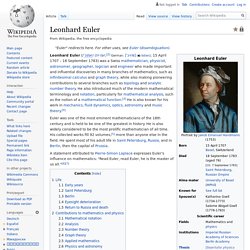
He is also widely considered to be the most prolific mathematician of all time. His collected works fill 92 volumes,[5] more than anyone else in the field.